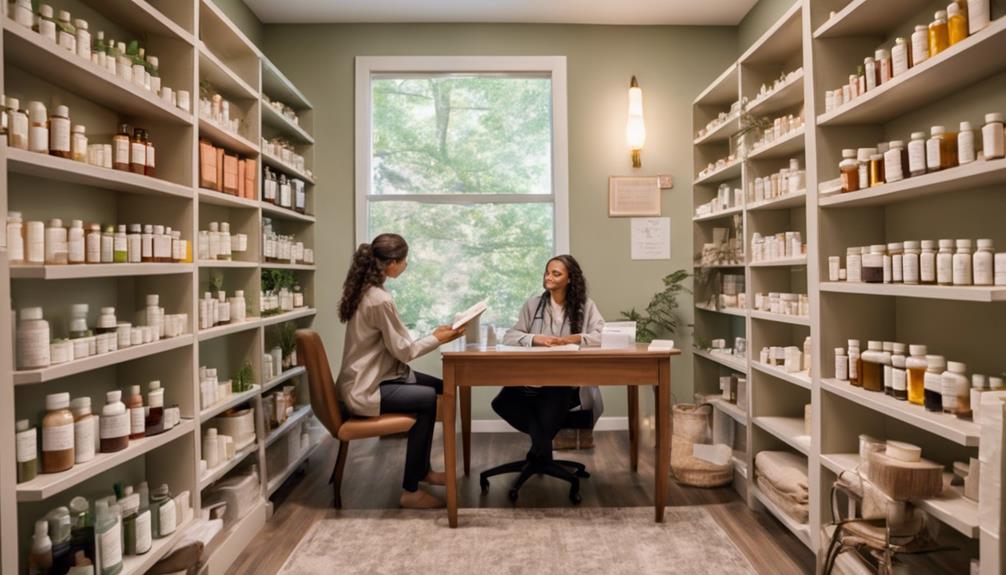Finding a qualified homeopathic doctor in your area is a vital step towards achieving holistic wellness and addressing your unique health concerns. Start by verifying a doctor’s credentials, checking for a degree in homeopathy from a reputable institution, licensure, and certification from a recognized organization. Online directories, professional organizations, and review platforms can help you narrow down your search by location, specialty, and modality. As you research and find a qualified homeopathic doctor, you’ll be one step closer to understanding how this holistic approach can help you achieve balance and wellness – and there’s more to discover about this journey.
Understanding Homeopathic Medicine

Understanding Homeopathic Medicine
Homeopathic medicine is a system of alternative healthcare that originated in the late 18th century, founded by German physician Samuel Hahnemann.
This holistic approach focuses on treating the individual, not just the symptoms of a disease. Homeopathic practitioners believe that the body has the capacity to heal itself and that the right remedies can stimulate this natural healing process.
The core principle of homeopathy is the “law of similars,” which states that a substance that causes symptoms in a healthy person can be used to treat similar symptoms in a person who is ill.
Homeopathic remedies are derived from plants, minerals, and animals, and are highly diluted to remove any potential toxicity.
The goal of homeopathic treatment is to restore balance to the body, mind, and spirit, rather than just suppressing symptoms.
Treatment is often tailored to the individual, taking into account their unique physical, emotional, and mental characteristics.
Qualifications to Look for
Identifying a qualified homeopathic doctor is pivotal to receiving effective treatment.
When searching for a homeopathic doctor, paramount importance lies in looking for specific qualifications that guarantee they have the necessary knowledge and skills to provide quality care. A qualified homeopathic doctor should have a degree in homeopathy from a reputable institution, such as a Doctor of Homeopathic Medicine (DHM) or a Master of Science in Homeopathy (MSc).
Additionally, they should be licensed to practice in their state or country. It’s also imperative to check if they are certified by a recognized homeopathic organization, such as the Council for Homeopathic Certification (CHC) or the North American Society of Homeopaths (NASH).
Furthermore, a qualified homeopathic doctor should have experience in treating patients with conditions similar to yours. They should also stay up-to-date with the latest research and developments in homeopathic medicine.
Finding Homeopathic Doctors Online

When searching for a homeopathic doctor, the internet can be a valuable resource, providing access to a vast network of practitioners and their credentials.
Online directories and professional organizations can help narrow down the search by location, specialty, and modality. The National Center for Homeopathy and the American Institute of Homeopathy are two reputable organizations that provide directories of licensed homeopathic doctors.
Additionally, online platforms such as Healthgrades, RateMDs, and Zocdoc allow patients to search for homeopathic doctors in their area and filter results by insurance, language, and availability.
Patients can also utilize online search engines to find homeopathic doctors near them. Using specific keywords such as “homeopathic doctor near me” or “homeopathic doctor in [city/state]” can yield a list of local practitioners.
Moreover, social media platforms and online forums can provide valuable insights into a doctor’s reputation and patient satisfaction. By leveraging these online resources, patients can efficiently find a qualified homeopathic doctor who meets their needs.
Checking Credentials and Reviews
Verifying a homeopathic doctor’s credentials and reading reviews from previous patients are crucial steps in the search process, as they provide valuable insights into a practitioner’s qualifications, experience, and approach to care.
When checking credentials, look for a doctor’s certification from a reputable homeopathic organization, such as the Council for Homeopathic Certification or the North American Society of Homeopaths.
Additionally, confirm the doctor is licensed to practice in their state and has a current registration with the relevant medical board.
Reviews from previous patients can provide insight into a doctor’s bedside manner, communication style, and effectiveness in treating conditions similar to yours.
Look for reviews on reputable websites, such as Healthgrades or RateMDs, and pay attention to the overall rating and comments.
Be wary of fake or biased reviews, and take the time to read multiple reviews to get a well-rounded understanding of the doctor’s practice.
What to Expect From Consultation

During the initial consultation with a homeopathic doctor, a thorough discussion of your medical history, symptoms, and lifestyle takes center stage, allowing the practitioner to gain an exhaustive understanding of your unique situation.
This extensive approach enables the doctor to identify patterns and connections that may not be immediately apparent, ultimately informing the development of a personalized treatment plan.
The consultation typically begins with a detailed questioning process, during which the doctor will ask about your symptoms, their duration, and any factors that may trigger or alleviate them.
They may also inquire about your diet, sleep patterns, stress levels, and other aspects of your daily life.
This information is vital in helping the doctor understand the underlying causes of your condition and determining the most effective course of treatment.
Throughout the consultation, the doctor will take detailed notes and may perform a physical examination or request laboratory tests to support their diagnosis.
The goal of this initial consultation is to establish a clear understanding of your health concerns and develop a tailored treatment plan that addresses your unique needs and promotes peak wellness.
Building a Doctor-Patient Relationship
A thorough initial consultation sets the stage for a collaborative doctor-patient relationship, which is fundamental to the success of homeopathic treatment.
During this consultation, the homeopathic doctor takes the time to understand the patient’s unique symptoms, medical history, and lifestyle.
This allows the doctor to develop a personalized approach tailored to the patient’s specific needs.
Building trust is a vital aspect of this relationship.
The doctor-patient collaboration relies on open communication, mutual respect, and empathy.
A skilled homeopathic doctor will actively listen to the patient’s concerns, answer questions, and provide guidance throughout the treatment process.
In return, the patient should feel comfortable sharing their experiences, asking questions, and following the recommended treatment plan.
A strong doctor-patient relationship fosters a sense of security and confidence, enabling patients to take an active role in their healthcare.
Creating a Personalized Treatment Plan

Following a thorough initial consultation, the homeopathic doctor develops an exhaustive and individualized treatment plan that addresses the patient’s unique symptoms, medical history, and lifestyle factors.
This tailored approach considers the patient’s physical, emotional, and mental well-being, guaranteeing a holistic approach to healing. The treatment plan may involve homeopathic remedies, dietary recommendations, and lifestyle modifications aimed at alleviating symptoms and promoting overall wellness.
The doctor takes into account the patient’s specific health concerns, such as chronic conditions, allergies, and sensitivities, to create a personalized plan that is both effective and safe.
The treatment plan is regularly reassessed and adjusted as needed to certify the patient is progressing towards peak health. By taking a thorough and individualized approach, homeopathic doctors can help patients achieve long-term wellness and improved quality of life.
Maintaining Wellness and Follow-up Care
The patient’s journey to peak wellness is a continuous process that extends beyond the initial treatment plan, requiring ongoing monitoring and adjustments to guarantee sustained progress.
Homeopathic doctors understand that every individual’s path to wellness is unique and may require periodic fine-tuning to address emerging health concerns or maximize treatment outcomes.
Regular follow-up appointments with a homeopathic doctor are essential to maintaining wellness.
These sessions enable the doctor to assess the patient’s response to treatment, identify any potential obstacles to progress, and make necessary adjustments to the treatment plan.
By closely monitoring the patient’s health, homeopathic doctors can also detect and address underlying imbalances before they manifest as symptoms.
Through ongoing care and support, homeopathic doctors empower patients to take an active role in their health journey, providing guidance on lifestyle modifications, nutrition, and stress management.
Frequently Asked Questions
Can Homeopathic Doctors Prescribe Conventional Medicine?
In general, homeopathic doctors, depending on their licensure and jurisdiction, may not prescribe conventional medicine unless they are also licensed medical doctors or have collaborative arrangements with licensed medical professionals.
Are Homeopathic Remedies Safe for Pregnant Women?
Pregnant women should exercise caution when using homeopathic remedies, as limited research exists on their safety during pregnancy. Some remedies may contain substances that could stimulate uterine contractions or interact with conventional medications, highlighting the importance of consulting a qualified healthcare provider before use.
Do Homeopathic Doctors Treat Mental Health Conditions?
Homeopathic doctors do treat mental health conditions, addressing anxiety, depression, and stress by identifying underlying causes and prescribing individualized remedies to restore emotional balance and promote overall well-being.
Can I Use Homeopathic Remedies With Prescription Medication?
When considering combining homeopathic remedies with prescription medication, it’s vital to consult a qualified healthcare professional to guarantee safe and effective interactions, as potential interactions and side effects can occur.
Are Homeopathic Treatments Covered by Insurance?
Insurance coverage for homeopathic treatments varies widely, with some plans covering certain services or products, while others exclude them entirely. It is essential to review your policy and consult with your insurance provider to determine the extent of coverage.
Conclusion
Homeopathic Doctors Near Me
Understanding Homeopathic Medicine
—————————
Homeopathic medicine is a system of alternative healthcare that aims to treat the whole person, not just the symptoms of a disease. It is based on the principle of “like cures like,” where highly diluted substances are used to treat various health conditions. Homeopathic doctors, also known as homeopaths, use a holistic approach to diagnose and treat patients.
Qualifications to Look for
————————-
When searching for a homeopathic doctor, it is essential to look for certain qualifications and credentials. A legitimate homeopathic doctor should have a degree in homeopathy from an accredited institution and be licensed to practice in their state or country. Additionally, they should have experience in treating patients with similar health conditions.
Finding Homeopathic Doctors Online
—————————–
The internet is a valuable resource for finding homeopathic doctors near you. Online directories such as the National Center for Homeopathy and the American Institute of Homeopathy provide lists of licensed homeopaths in the United States. Patients can also search for homeopathic doctors on online review platforms such as Healthgrades and RateMDs.
Checking Credentials and Reviews
——————————-
Before consulting a homeopathic doctor, it is crucial to check their credentials and read reviews from previous patients. This helps to ensure that the doctor is qualified and has a good reputation. Patients should also check if the doctor is a member of any professional organizations, such as the National Center for Homeopathy.
What to Expect From Consultation
—————————–
During the initial consultation, the homeopathic doctor will ask questions about the patient’s medical history, symptoms, and lifestyle. They will then use this information to create a personalized treatment plan, which may include homeopathic remedies, dietary changes, and lifestyle modifications.
Building a Doctor-Patient Relationship
———————————
A good doctor-patient relationship is essential for effective treatment. Patients should feel comfortable discussing their health concerns with their homeopathic doctor and should be able to ask questions and seek clarification on their treatment plan.
Creating a Personalized Treatment Plan
———————————-
A homeopathic doctor will create a personalized treatment plan based on the patient’s unique health needs. This plan may include homeopathic remedies, dietary changes, and lifestyle modifications. The doctor will also provide guidance on how to manage symptoms and prevent future health problems.
Maintaining Wellness and Follow-up Care
————————————-
After the initial consultation, patients should schedule follow-up appointments to monitor their progress and make any necessary adjustments to their treatment plan. A homeopathic doctor will also provide guidance on how to maintain wellness and prevent future health problems.
[CONCLUSION]:
Homeopathic medicine offers a holistic approach to healthcare, focusing on treating the whole person, not just the symptoms of a disease. By understanding homeopathic medicine, identifying qualified homeopathic doctors, and building a doctor-patient relationship, patients can receive effective and personalized treatment for their health concerns.




0 Comments